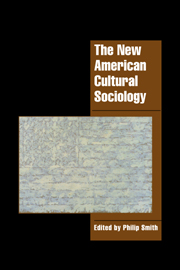Book contents
- Frontmatter
- Contents
- Notes on contributors
- Preface
- The new American cultural sociology: an introduction
- PART I Culture as text and code
- PART II The production and reception of culture
- 6 The reception of Derrida's work in France and America
- 7 Censorship, audiences, and the Victorian nude
- 8 The Devil, social change, and Jacobean theatre
- 9 Victorian women writers and the prestige of the novel
- 10 The ambiguous and contested meanings of the Vietnam Veterans Memorial
- PART III Culture in action
- Index
- Title in this Series
8 - The Devil, social change, and Jacobean theatre
Published online by Cambridge University Press: 18 January 2010
- Frontmatter
- Contents
- Notes on contributors
- Preface
- The new American cultural sociology: an introduction
- PART I Culture as text and code
- PART II The production and reception of culture
- 6 The reception of Derrida's work in France and America
- 7 Censorship, audiences, and the Victorian nude
- 8 The Devil, social change, and Jacobean theatre
- 9 Victorian women writers and the prestige of the novel
- 10 The ambiguous and contested meanings of the Vietnam Veterans Memorial
- PART III Culture in action
- Index
- Title in this Series
Summary
Culture orients people. As a shared system of meaning embodied in symbols, culture provides the categories and models human beings use to take their bearings and steer through the exigencies of social and economic life. Where these exigencies themselves are changing rapidly, such bearings take on significant causal force.
The following investigation starts from a cultural puzzle: the rehabilitation of the Devil's techniques. Innovation, calculation, and the seizure of profitable opportunities presented by another person's weakness had long been condemned by the Church as damnable and regarded by the English elite as contemptible. English drama from the medieval through the mid-Renaissance periods portrayed the prevalent theological and social disdain for entrepreneurs bent on the pursuit of money. But these very economic activities, the Devil's techniques, became admirable on the Jacobean London stage. In a remarkable cultural somersault, that which earlier drama had condemned as vicious was now being offered as practical instruction for the ambitious young men who attended the theatres. Culture, in the character of the Gallant, made a social virtue out of an economic necessity.
The genealogy of the Gallant
New cultural forms never simply “arise” from social circumstances. To be comprehended and enjoyed by an audience, they must draw upon a history of recognizable cultural conventions. The City Comedy Gallant was the Jacobean avatar of an old character in Western culture, the Trickster, who had undergone a number of transformations on the English stage while retaining his essential attributes.
The Trickster
The Trickster, a universal figure in folklore (Leach 1950), is the weak character who uses his cunning to triumph over the strong. Tricksters are creatures of their appetites, gastronomic and priapic.
- Type
- Chapter
- Information
- The New American Cultural Sociology , pp. 126 - 140Publisher: Cambridge University PressPrint publication year: 1998

